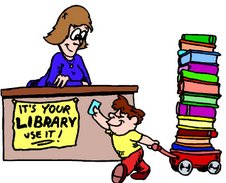This book REALLY made me think a lot about privacy issues (especially
online privacy)and how much information so many people are willing to
give up about themselves on a daily basis when they use social
networking sites. I was surprised how much I appreciated and liked the
explanation of the fairly involved mathematical ideas inserted as part
of the storyline in order for the story's plot to make even more sense.
The whole idea of a society giving up personal freedoms in order to
feel some pseudo sense of security reminded me again how drastically
older American's lives are post 9/11. When I contrast this current way
of life compared to my life as a young teen decades ago--the comparison
is pretty disheartening (heck, I'm old enough to remember when flying
was a FUN adventure--none of the security lines, scanning or shoe
removal). While most teen readers today won't have that perspective,
the way the story presents the "other" side of homeland security will
resonate and even creep them out. If readers want to know what a number
of librarians think about privacy (other than we're big time
promoters of the idea, visit website here
My rating: You're not paranoid if the ARE after you...
Wednesday, June 29, 2011
Monday, June 6, 2011
Looking for Alaska by John Green
Okay, so I started my day by reading this article from yesterday in the
Wall Street Journal entitled "Darkness Too Visible," linked here
by Meghan Cox Gurdon. The subtitle is "Contemporary fiction for teens is
rife with explicit abuse, violence and depravity. Why is this
considered a good idea?"
While Ms Gurdon makes some thought-provoking points and I'm quite certain that she would use Looking for Alaska by John Green as an example of what she refers to in her headline, what she would likely miss in the explicit parts of the Alaska's story (which CAN be a bit over-the-top at times) would be the genuine gifts the story offers as well. Teen years are tough and for a teen (even a fictional one) to offer the articulated realization is priceless "...She must have come to feel so powerless, I thought that the one thing she might have done--pick up the phone and call an ambulance--never even occurred to her. There comes a time when we realize that our parents cannot save themselves or save us , that everyone who wades through time eventually gets dragged out to sea by the undertow--that, in short, we are all going."
Instead of this book getting stuck in the tragedy Alaska's story, the patient reader is offered a great deal of food for thought... one tidbit is the unmistakable offering of "life as gift" and "every life makes a difference". As the author states:
"When adults say, 'Teenagers think they are invincible' with that sly, stupid smile on their faces, they don't know how right they are ....like all energy, we can only change shapes and sizes and manifestations....But the part of us greater than the sum of our parts cannot begin and cannot end, and so it cannot fail."
This book isn't likely to be one I'll recommend to most of my youngish middle-school readers, but there are always a few for whom this story will resonate and make them pause to reflect and I'll certainly keep this story in my repertoire of suggestions.
By the way another point of view to the teen lit controversy is offered by author Laurie Halse Anderson linked here ... thought provoking!
My ranking: Alaska...my first summer read :)
While Ms Gurdon makes some thought-provoking points and I'm quite certain that she would use Looking for Alaska by John Green as an example of what she refers to in her headline, what she would likely miss in the explicit parts of the Alaska's story (which CAN be a bit over-the-top at times) would be the genuine gifts the story offers as well. Teen years are tough and for a teen (even a fictional one) to offer the articulated realization is priceless "...She must have come to feel so powerless, I thought that the one thing she might have done--pick up the phone and call an ambulance--never even occurred to her. There comes a time when we realize that our parents cannot save themselves or save us , that everyone who wades through time eventually gets dragged out to sea by the undertow--that, in short, we are all going."
Instead of this book getting stuck in the tragedy Alaska's story, the patient reader is offered a great deal of food for thought... one tidbit is the unmistakable offering of "life as gift" and "every life makes a difference". As the author states:
"When adults say, 'Teenagers think they are invincible' with that sly, stupid smile on their faces, they don't know how right they are ....like all energy, we can only change shapes and sizes and manifestations....But the part of us greater than the sum of our parts cannot begin and cannot end, and so it cannot fail."
This book isn't likely to be one I'll recommend to most of my youngish middle-school readers, but there are always a few for whom this story will resonate and make them pause to reflect and I'll certainly keep this story in my repertoire of suggestions.
By the way another point of view to the teen lit controversy is offered by author Laurie Halse Anderson linked here ... thought provoking!
My ranking: Alaska...my first summer read :)
Subscribe to:
Posts (Atom)




